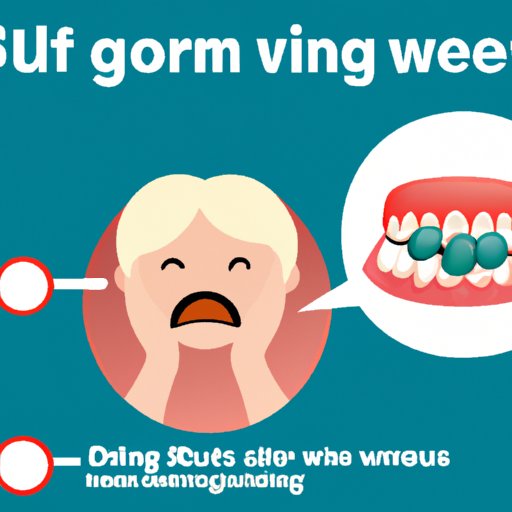Introduction
Sore gums are common and can affect people of all ages. For some, sore gums may be a minor inconvenience that goes away on its own, while for others, it may indicate a more serious oral health problem. In this article, we will explore the possible causes of sore gums, signs and symptoms to be aware of, and ways to prevent and treat this uncomfortable situation.
It’s important to note that seeking professional help is always recommended if you’re experiencing persistent, severe pain or symptoms such as bleeding gums. A dental professional can accurately diagnose and recommend the appropriate treatment for your specific gum condition.
7 Common Causes of Sore Gums and How to Treat Them
There are several possible causes of sore gums, each with its own set of symptoms and treatment options.
Gingivitis
Gingivitis is the most common cause of sore gums, affecting many people each year. It’s a mild form of gum disease caused by the buildup of plaque and bacteria in the gums. Symptoms can include swelling, redness, and tenderness of the gums.
Treatment: Good oral hygiene, such as regular brushing and flossing, can help prevent and treat gingivitis. A dental professional may also recommend a deep cleaning or scaling and root planing to remove plaque and bacteria from below the gum line.
Canker Sores
Canker sores are small, painful ulcers that can develop on the gums, tongue, cheeks, or lips. They are not contagious and usually heal on their own within a week or two.
Treatment: Over-the-counter medications such as mouthwashes and gels can help relieve the pain of canker sores. Avoiding spicy or acidic foods that can irritate the sore is also recommended.
Periodontitis
Periodontitis is a more severe type of gum disease that can cause damage to the bones and tissues that support the teeth. Symptoms include bleeding gums, bad breath, and tooth loss.
Treatment: A dental professional may recommend deep cleaning, scaling and root planing, and antibiotic therapy to alleviate the symptoms of periodontitis. In severe cases, surgery may be necessary.
Malnutrition
A diet lacking in essential vitamins and minerals can lead to sore gums and other oral health problems.
Treatment: Eating a well-balanced diet including foods such as fresh fruits and vegetables, whole grains, and lean protein can help prevent nutritional deficiencies that can lead to sore gums.
Injury
An injury to the gums, such as from a fall or accidental biting, can cause soreness and bleeding.
Treatment: Keeping the area clean and avoiding further irritation can help the gums to heal. A dental professional may recommend an oral rinse to prevent infection.
Hormonal Changes
Hormonal changes during puberty, pregnancy, and menopause can cause sore gums.
Treatment: Good oral hygiene, including regular brushing, flossing, and dental exams, can help manage hormonal changes that can lead to sore gums.
Medication Side Effects
Some medications can cause gum inflammation and soreness, including birth control pills, blood pressure medications, and chemotherapy drugs.
Treatment: Talking to a doctor or dental professional about medication side effects can help determine if there is another medication that may be suitable or if a dosage adjustment is necessary.

When to Worry About Sore Gums: Signs and Symptoms
While mild gum soreness can often be treated with at-home remedies, some warning signs should prompt you to seek help from a dental professional. These signs include:
- Bleeding gums
- Persistent pain and swelling
- Loose teeth
- Chronic bad breath
- Gum recession or sensitivity
- A change in the color or texture of the gums
If you experience any of these symptoms, it’s best to schedule an appointment with a dental professional who can provide a proper diagnosis and treatment plan.
The Link Between Oral Hygiene and Sore Gums: A Comprehensive Guide
Good oral hygiene is crucial in preventing the onset of gum disease and sore gums. Here are some tips to follow:
- Brush twice a day for at least two minutes with a fluoride toothpaste.
- Floss daily to remove debris and bacteria from between the teeth.
- Use an antiseptic mouthwash to help prevent infection and bad breath.
- Replace your toothbrush every three to four months.
- Avoid smoking and tobacco use, which can increase your risk of gum disease and oral cancer.
In addition to practicing good oral hygiene, there are some additional preventative measures you can take to avoid sore gums:
- Eat a healthy diet rich in vitamins and minerals
- Avoid sugary and acidic foods and drinks that can erode tooth enamel and irritate the gums
- Stay hydrated by drinking plenty of water and avoiding drinks high in sugar and caffeine
- Chew sugar-free gum to help stimulate saliva production, which can neutralize acids and bacteria in the mouth
5 Professional Tips to Relieve Sore Gums at Home
While it’s important to seek professional help for persistent or severe symptoms, there are some remedies you can try at home to alleviate mild gum soreness. Here are five tips recommended by dental professionals:
- Saltwater rinse
- Hydrogen peroxide rinse
- Clove oil
- Aloe vera gel
- Tea tree oil
It’s important to note that while these remedies are generally safe, they may not be suitable for everyone. It’s recommended to consult with a dental professional before using at-home remedies.
Sore Gums and Overall Health: What You Need to Know
Did you know that your oral health can impact your overall health? Gum disease has been linked to several serious health conditions, including heart disease, stroke, and diabetes. It’s important to prioritize good gum health and include dental care as a part of your overall health routine.
In addition to regular dental cleanings and exams, maintaining a healthy diet, staying active, and getting enough sleep can help promote good gum health and overall wellness.
Natural Remedies for Sore Gums: A Holistic Approach
For those who prefer a more natural approach to healthcare, there are several natural remedies recommended by dental professionals that can work alongside traditional treatment. These remedies include:
- Chamomile tea
- Vitamin C supplements
- Gum massage
- Green tea
- Coconut oil pulling
It’s important to note that while these remedies may be effective for relieving mild symptoms, they should not be used in place of professional treatment. It’s always best to consult with a dental professional before beginning any new treatment regimen.
Conclusion
Sore gums are a common problem that can be caused by several factors, from poor oral hygiene to underlying health conditions. Maintaining good gum health through regular dental cleanings and exams, practicing good oral hygiene, and following preventative measures can help prevent sore gums from occurring in the first place. If you are experiencing persistent or severe symptoms, it’s important to seek professional help to accurately diagnose and treat any underlying issues.
Remember: good oral health plays a vital role in overall wellness, so be sure to prioritize your gum health as a part of your overall health routine.
